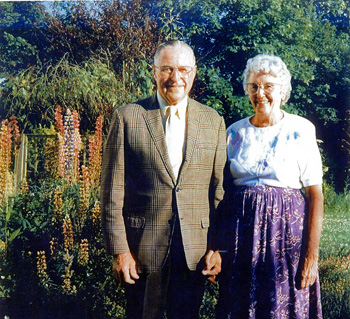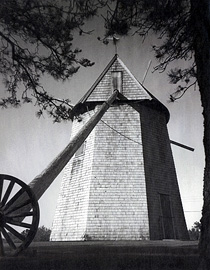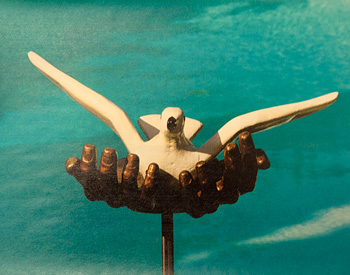Gift for visual resources program will help build library's future

Ned '49 and Pat Trethaway in a 1994 photo. Trethaway has established a trust and created an endowed fund for Cornell's Division of Rare and Manuscript Collections in honor of his father, Joseph D. Trethaway '20.
After a close relationship with Cornell that spans seven decades, Edward "Ned" J. Trethaway '49 has given an enduring gift to Cornell University Library that will enhance its visual resources program.
With help from University Archivist Elaine Engst, Trethaway established a trust and created an endowed fund for the Division of Rare and Manuscript Collections in honor of his father. The Joseph D. Trethaway Class of 1920 Fund will help to significantly expand the acquisition, preservation and use of visual materials in all formats -- especially photographs, which are of particular interest to Trethaway.
Income from the fund can be used for a myriad of library activities, including but not limited to: purchase of such materials as photographs, films and books on the history of photography or graphic arts; arrangement and cataloging; conservation and restoration; improved housing and storage; development and implementation of new access tools; and exhibitions, lectures, publications and programs on the history of photography and graphic arts.

Trethaway's photo of The Grist Mill in Chatham, Mass. on Cape Cod. Trethaway donated a large print of this image to Kendal of Ithaca.
The fund allows for flexibility to take advantage of changing technologies while also honoring a particular subject area singled out by the donor.
Additionally, Trethaway created a one-time exhibit fund that contributed to presenting "I Will Be Heard: Abolitionism in America," a 2003 exhibition in the Hirshland Gallery. Some of those funds also went toward re-framing Cornell's copy of the Gettysburg Address, a double-sided document that is one of only five existing copies written in Abraham Lincoln's own hand.
Trethaway and Engst designed a program that would be viable 45 years in the future, when it will receive Trethaway's full bequest. Trethaway is also a Cornell foremost benefactor, meaning that he has given the university $1 million and is honored on the wall of Uris Library.
"Elaine and [I were] working together -- doing things that were mutually helpful. It was beautiful to watch it unfold," Trethaway said.
Trethaway first came to the university in July 1944 as a member of the Class of 1948. He left in February 1945 to join the Navy; after his military service, he returned to Cornell and graduated in 1949 with a degree in mechanical engineering. He worked in the engineering field until 1963, when he returned to Cornell to, in his words, "contribute to a worthwhile cause and improve society in general."

Trethaway's photo of a sculpture of a bird and hands made out of styrofoam by his friend Louis Schimoler DVM '47. The sculpture is titled "Let Your Aspirations Soar."
Trethaway joined the university's Centennial Campaign in New York City, and two years later, he moved to the Ithaca campus as the director of corporate development. In 1976, he transferred his efforts to the New York State College of Veterinary Medicine and started the college's public affairs office, coordinating efforts in development, alumni relations and public relations. The program flourished, and Trethaway took early retirement in 1982.
The library helped Trethaway edit and publish his three-volume autobiography in 2002 and 2003, and his personal collection is also stored in the archive. "The Edward J. Trethaway Papers, 1936-2002" includes 18 boxes of correspondence, reports, legal documents, brochures, pamphlets, photographs, audiotapes and memorabilia.
"We're very fortunate to have friends like Ned who enable us to build, support and enhance our visual collections, which are becoming increasingly important to faculty, students and scholars," Engst said.